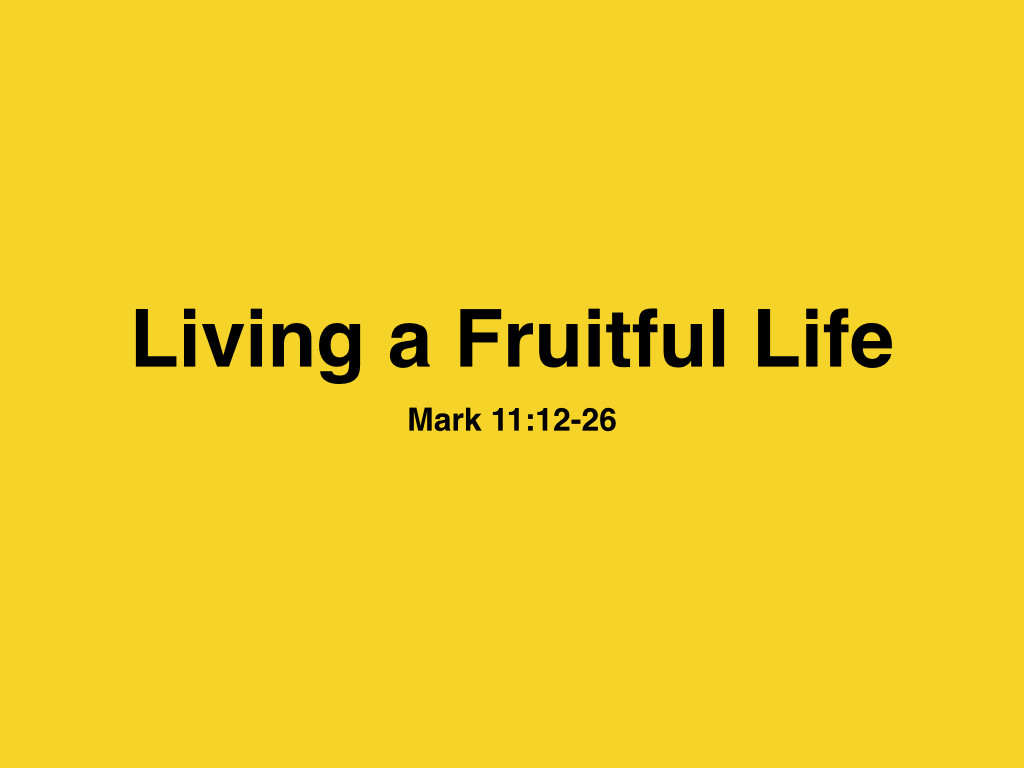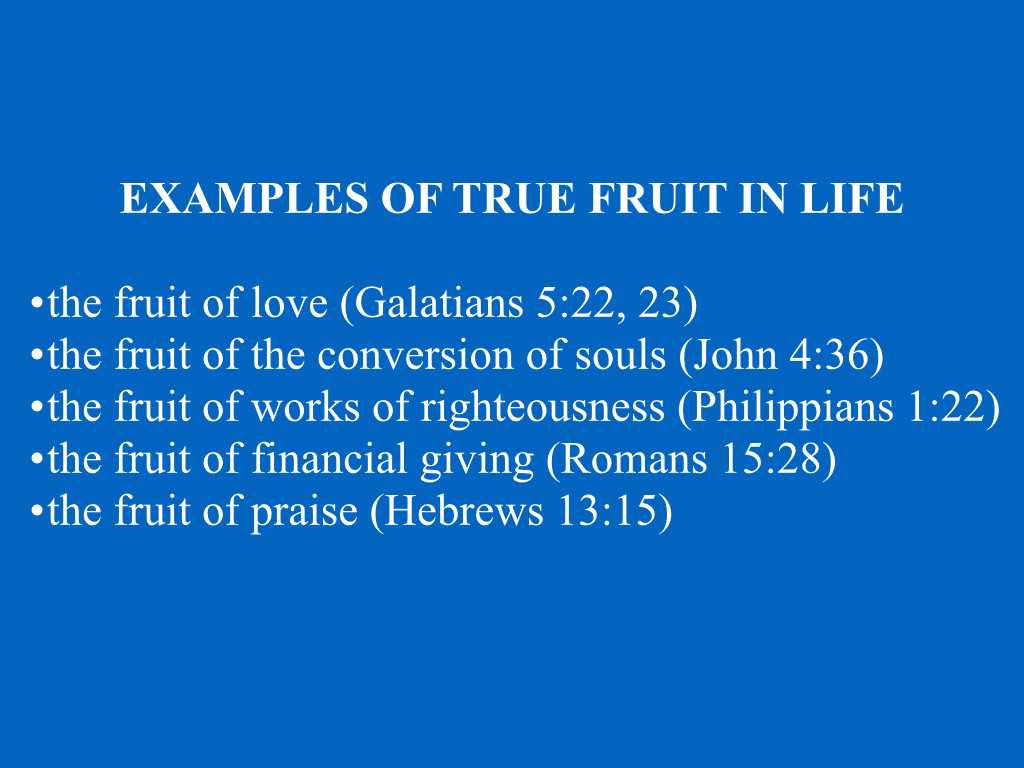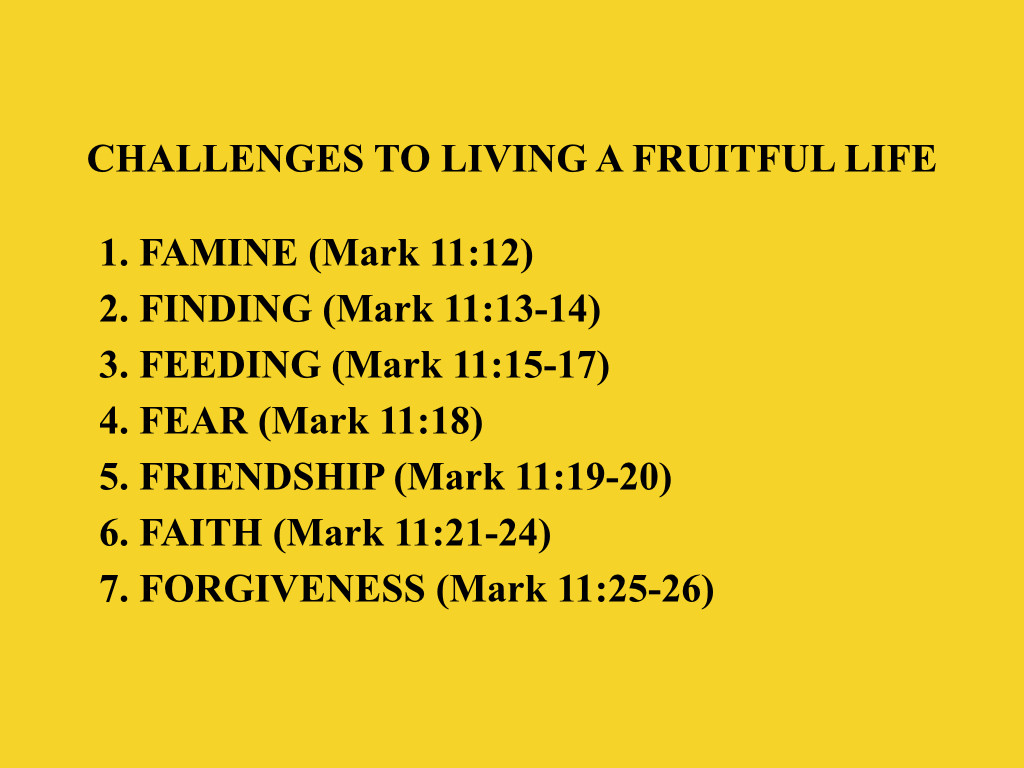Mark 11:12-26 Living a Fruitful Life
Graduation is a very important achievement in the life of a student. It says that you have accomplished a task, a goal and that you have finished what you started. Graduation is also a rite of passage. You have grown up. You have grown out of the times of learning to the times of applying what you have learned. You have grown out of the times of studying to the times of doing.
You may be young, but you are not children. You have grown up. You are not just young adults, but well-educated young adults. But more importantly, you are the leaders of the next generation.
As pastor, I have been proud to see you walk through our doors in the church. It has been a privilege to see you grow up. Everyone in the church would agree that it is a special privilege to have you amongst our church family. Why?
Because we know that you will make an impact in your generation. We know that God is going to use you. We agree that you will be the leaders, movers, and innovators of the next generation.
Many of you have been taught from teachers, and you have also received help from the Fellowship of Christian Athletes chapter at the school. You have also been fed here at this church. In essence, your roots have been firmly established. You are like the fig tree that Jesus encountered. Your scholarly and spiritual roots are grounded firmly. There is no denying that you have been well-fed.
The fig tree teaches us a lesson about ourselves and being grown up. The leaves have returned, but there is no fruit. Fruit naturally grows at the same time as the leaves. So since there were leaves, there should have been fruit. The leaves point to the fact that fig tree grew, but there should have been fruit. Since the leaves show that there should have been fruit, it was very odd that the fig tree had leaves but no fruit.
Therefore disciples never questioned the fact that Jesus cursed it. They did not say to Jesus “Hey, teacher, give this tree a chance!” No, they were amazed that the tree died. So what does this experience with the fig tree teach us as Christians?
When a tree grows, the natural consequence of growth is to produce fruit. You know that the tree has grown, because it has produced fruit.
In the same way, you have grown here, and now the obligation is to produce. You have received an excellent education, and now it is time to build a career, return to your homeland or somewhere else and make an impact. Sure some folks here will go and further their studies, but in the end, you will produce. It is expected that since you (or your parents) have invested so much time and money in yourself, you would put it to good use.
Spiritually speaking, you are also expected to produce. You have been taught by Christian leaders and you have participated in a wealth of experiences that require you to produce. This means that there will come a time when you need to trust God in faith. Some of you will do that when you make decisions where you will go. This is what Jesus means when He talks about moving mountains. You will begin to live by faith even after you have graduated because you have been firmly rooted. You have been nourished and watered. You have grown up. A grown-up Christian is a Christian who lives by faith.
But what I want you to notice is this: Jesus curses the fig tree because the fig tree did not produce out of season. That is strange. You expect a fig tree to produce in late May or June. But Jesus cursed the fig tree because it didn’t produce fruit even when the fig tree wasn’t expected to produce, in early April.
It wasn’t the season for figs. But Jesus wanted to eat a fig. It would be like if Jesus was walking down the streets of Cassville and goes to the local McDonald’s and He wants to order a hamburger. But no one is producing hamburgers. Because it is 2 o’clock in the morning. Jesus is like some of you. He has been up all night studying or doing something, and now Jesus is hungry. He’s got the late night munchies. So he goes over to the McDonald’s. McDonald’s is open, but they are not serving hamburgers at 2am. The workers are not even serving breakfast at 2am. They are just sitting there inside the McDonald’s playing cards, but not producing. The employees think it is too early for the store to be serving customers. So Jesus closes the store and says it cannot open ever again.1
The picture of cursing the fig tree and the people in the temple who were prophesying, yet not praying is like a person who graduates from school but doesn’t put the learning into good use. What is true for the graduate is also true for the church.
EXAMPLES OF TRUE FRUIT IN LIFE
I wonder if Jesus comes by our lives in the morning hours desiring fruit. Outwardly, because of our abundance of leaves—our activities and words—we might look like we’ve got it together. But upon closer inspection, it is obvious to Him that we lack true fruit—
• the fruit of love (Galatians 5:22, 23),
• the fruit of the conversion of souls (John 4:36),
• the fruit of works of righteousness (Philippians 1:22),
• the fruit of financial giving (Romans 15:28),
• the fruit of praise (Hebrews 13:15).2
Mark provides us with another sandwich. The fig tree story tops and tails this passage so that both themes are seen to be intertwined. The fig tree was seen as a symbol of Israel, the Temple was the nation’s ritual heart. In this section both are seen to be dried up, corrupt and utterly barren. Instead of blossoming and fruiting at the dawning of the messianic age, the fig tree is found to be nothing but leaf (v. 13). Like Israel, the fig tree is unable to deliver (or be fruitful).3
With this in mind, let me share with you the challenges you will face to living a fruitful life.
CHALLENGES TO LIVING A FRUITFUL LIFE
1. FAMINE (Mark 11:12)
“The next day when they came out from Bethany, He was hungry.” (Mark 11:12, HCSB)
“Hear this! The days are coming— this is the declaration of the Lord God— when I will send a famine through the land: not a famine of bread or a thirst for water, but of hearing the words of the Lord.” (Amos 8:11, HCSB)
The first challenge to a fruitful life is dealing with spiritual famine. Because there is a spiritual famine, I need to find God’s unfulfilled spiritual hunger in my life. All kinds of people will be searching to hear God’s Word. Water, water, everywhere but not a drop to drink. Bibles, Bibles, everywhere but no one to speak.
There will be fewer people who will rightly divide the word of truth. Fewer people willing to speak out and say what the Bible says to society and life. Fewer people who can share the word of God. People will look for them, but these people will be rare. Either because of persecution, or because of indifference, there will be many churches, but few people speaking the Word of God. Churches everywhere, but few people sharing the Word of God.4
It is always there. Jesus was hungry and He wanted to be filled. He wanted a servant (a fig tree) to fill His spiritual hunger. God has placed a spiritual hunger in your life which only He can satisfy.
2. FINDING (Mark 11:13-14).
“After seeing in the distance a fig tree with leaves, He went to find out if there was anything on it. When He came to it, He found nothing but leaves, because it was not the season for figs. He said to it, “May no one ever eat fruit from you again!” And His disciples heard it.” (Mark 11:13–14, HCSB)
To come up the challenge of a fruitful life, one has to find out of what God wants me to do in and out of season.
There was nothing on the fig tree. In this case, one might wonder why Jesus chose a tree without fruit. However, Jesus expected to find something, even if the season was early for fruit. According to experts, even if there were no full figs, there would have been small pieces for poor people to eat. Jesus did expect something to be on the tree to eat. It reminds one of the parable of the talents. Jesus said that someone should have at least put the money in the bank. At least then, it would have collected interest.
Someone who does not discover what produces fruit, will be discarded. Discovering what fruit you produce in life, your purpose in life, what God has given you to do, is very important to being fruitful.
3. FEEDING (Mark 11:15-17)
“They came to Jerusalem, and He went into the temple complex and began to throw out those buying and selling in the temple. He overturned the money changers’ tables and the chairs of those selling doves, and would not permit anyone to carry goods through the temple complex. Then He began to teach them: “Is it not written, My house will be called a house of prayer for all nations? But you have made it a den of thieves!”” (Mark 11:15–17, HCSB)
To have a fruitful life, a Christian has to be feeding spiritual hunger through prayer and reading of the Word of God. God expects me to foraging my spiritual hunger with prayer instead of worldly appetites. In this case, Jesus came to the temple expecting to find a place to pray. Instead, people were exchanging commerce. Church has been commercialized. Prayer and worship has become worshiptainment. Spiritual hunger was filled with worldly appetites. People in the church were extorting one another. Instead of a place where one could focus on God, one found worldly people.
Jesus was outraged by this blatant disregard for the temple area specifically set apart for Gentile use.5
This happens today as well. We spend time coming a rockabilly concert, but we don’t come to worship God. People to listen to worship rock stars who want all of the attention when God is wanting everyone to worship for an audience of One – Himself. Prayer is neglected in church. Prayer is neglected at home. How can you make a difference in the lives of other people when you are stuffing your face full of worldly pleasure? One has to learn to feed from God. Jesus is the Bread of Life. The Word of God is our food. Prayer is our refreshment.
4. FEAR (Mark 11:18)
“Then the chief priests and the scribes heard it and started looking for a way to destroy Him. For they were afraid of Him, because the whole crowd was astonished by His teaching.” (Mark 11:18, HCSB)
Another challenge to a fruitful life is fending off fear that prevents me from spiritual nourishment.
In this case, the chief priests did not produce fruit because they feared the popularity of Jesus Christ. In this case, the religious leaders feared Jesus. They feared Jesus for Who He was. How many times have I not done something for Jesus because I fear someone else will get the credit?
5. FRIENDSHIP (Mark 11:19-20)
“And whenever evening came, they would go out of the city. Early in the morning, as they were passing by, they saw the fig tree withered from the roots up.” (Mark 11:19–20, HCSB)
The next challenge to a fruitful life as a Christian is friendship. When this event was over, they didn’t go to their own homes and live in isolation. Instead, they came together. Early in the morning they came together. They spent time with one another. They did not go somewhere else for spiritual nourishment. They didn’t find it in isolation.
Why didn’t this tree have fruit? Matthew’s original text makes it clear that this particular fig tree was a lone fig tree (21:19). Because fig trees require cross-pollination, a lone fig tree cannot produce fruit. And the same is true with believers. “I don’t need to go to church,” some say. “I can worship the Lord on my own.” Not true.
“Do not forsake the assembling of yourselves,” says the writer to the Hebrews (Hebrews 10:25). We need one another in order to bear fruit.6
6. FAITH – Having faith to do what God calls me to do (Mark 11:21-24)
“Then Peter remembered and said to Him, “Rabbi, look! The fig tree that You cursed is withered.” Jesus replied to them, “Have faith in God. I assure you: If anyone says to this mountain, ‘Be lifted up and thrown into the sea,’ and does not doubt in his heart, but believes that what he says will happen, it will be done for him. Therefore I tell you, all the things you pray and ask for —believe that you have received them, and you will have them.” (Mark 11:21–24, HCSB)
The sixth challenge from this passage that can prevent me from having a fruitful life is faith.
Jesus’ disappointment with the fig tree is like his disappointment with Israel and the temple, her chief shrine. His judgment pronounced upon the tree is like the threat of God’s judgment soon to fall upon the city of Jerusalem, which Jesus’ words and actions in verses 15–19 prefigure.7
Faith means trusting God to help me do what He calls me to do. Jesus says to have faith in God. We have to trust that God knows what He wants me to do in life. I can’t see ahead in the journey but God can. I have to trust Him for the big steps and little steps in my life.
It has well been said that the purpose of prayer is not to get man’s will done in heaven, but to get God’s will done on earth.8
For many people here, they have finished one event in life and are looking to the next. However, it may be hard to see how it will turn out. Will I get into college? How will my marriage turn out? How many kids will I have? We won’t know everything that will happen. However, we can trust God who will know.
7. FORGIVENESS (Mark 11:25-26)
“And whenever you stand praying, if you have anything against anyone, forgive him, so that your Father in heaven will also forgive you your wrongdoing. [But if you don’t forgive, neither will your Father in heaven forgive your wrongdoing.]”” (Mark 11:25–26, HCSB)
The final challenge to growing fruit in the Christian life is forgiveness. I have to learn to forgive others so that God can show me how He wants me to be fruitful. Forgiveness is tied to fruitfulness. I cannot have a fruitful life when I my life of full of unforgiveness. God does not use bitter people. God will only use people who is willing to forgive other people.
There is a direct relationship between my horizontal relationship and my vertical relationship. If I don’t forgive others, God will prevent me from being fruitful. If I ask God to forgive me, He will answer me. This verse seems to contradict 1 John 1:9:
“If we confess our sins, He is faithful and righteous to forgive us our sins and to cleanse us from all unrighteousness.” (1 John 1:9, HCSB)
However, 1 John 1:9 only deals with the vertical relationship. If I want to keep my lines of communication with God open, I have to make sure that I am confessing my sins on a regular basis. Mark 11:25-26 is dealing with my horizontal relationship and what can prevent my vertical relationship from being the best it can be. If I am spending time in my vertical relationship (God) and I realize that I have to forgive another person, then I need to work on that horizontal relationship. If I don’t, then my vertical temporarily suffers.
What was the point of this event? Jesus wants the tree, and by application His children, to be ready to produce at all times. You have learned some things for a reason. You have built some relationships for a reason. God wants you ready to serve Him. God has prepared you to be ready at any time to serve Him. God has given you this time of growth. Now He wants you to be ready to impact this generation for Him.
So go out there. Explore in faith the discoveries that God has for you. Look back at this time at Southwest High School with warm memories. Be ready for God to use you in mighty ways, in good and bad times. God wants you to influence and impact your generation. God loves you. He wants you to share that love with your generation.9
1 Jim Erwin, Mark 11:12-26 “Grown Up and Graduated,” Sermon, IBC Bremen, Germany, 1 June 2006. The sermon can be found here. This sermon was preached at a graduation of students at the International University of Bremen. Yes, as a pastor, I sometimes recycle sermon material.:)
2 Jon Courson, Jon Courson’s Application Commentary (Nashville, TN: Thomas Nelson, 2003), 268.
3 Phillip McFadyen, Open Door on Mark: His Gospel Explored (London: Triangle, 1997), 74–75.
4 Jim Erwin, Amos 8:11-13, “Famine for Hearing the Words of the Lord,” Lectionary Reflections Year B (2014-2015), Logos Bible 6.2, Notes, 1 May 2015.
5 John D. Grassmick, “Mark,” in The Bible Knowledge Commentary: An Exposition of the Scriptures, ed. J. F. Walvoord and R. B. Zuck, vol. 2 (Wheaton, IL: Victor Books, 1985), 158.
6 Jon Courson, Jon Courson’s Application Commentary (Nashville, TN: Thomas Nelson, 2003), 268.
7 Larry W. Hurtado, Mark, Understanding the Bible Commentary Series (Grand Rapids, MI: Baker Books, 2011), 180.
8 Warren W. Wiersbe, The Bible Exposition Commentary, vol. 1 (Wheaton, IL: Victor Books, 1996), 150.
9 Jim Erwin, Mark 11:12-26, “Grown Up and Graduated.” Sermon, IBC Bremen, Germany, 1 June 2006.

















